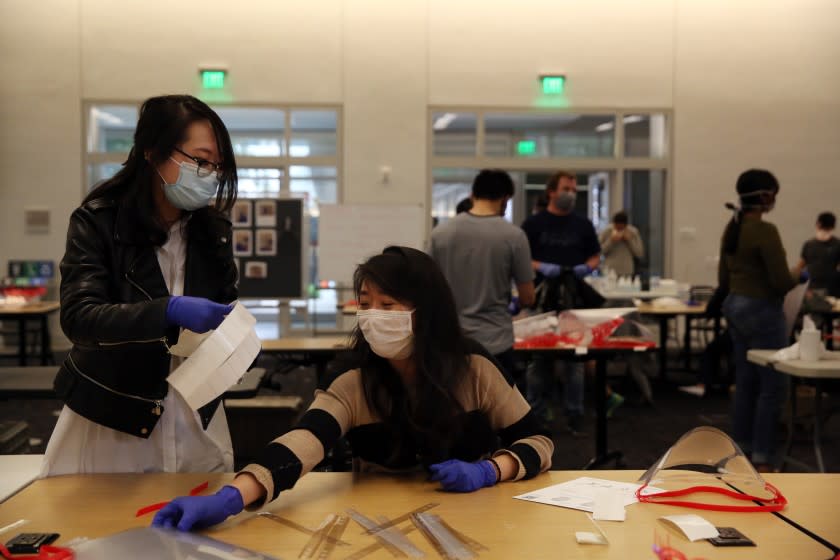How the nation's newest doctors are coping with disruptions caused by COVID-19

July 1 is a big day in medical education. It’s traditionally the day newly minted doctors start their first year of residency. But this year is different. Making the transition from medical school to residency training programs has been complicated by the coronavirus.
“We were all really freaking out,” said Dr. Christine Petrin, who just graduated from medical school at Tulane University in New Orleans and is starting a combined residency in internal medicine and pediatrics at MedStar Georgetown University Hospital in Washington, D.C.
Fourth-year students learned their residency assignments in March, just as everything was shutting down because of the pandemic. After getting the news of their placements, Petrin said, some of her friends were worried about being able to enter states that were closing their borders. They “just rapidly picked up and moved. Found an apartment, packed up the car and went.”
Petrin said she was lucky. Although she scoped out apartments online, her sister, who lives in Washington, could visit them in person.
Dr. Erin Fredrickson was not as fortunate. She graduated in May from Campbell University School of Osteopathic Medicine near Raleigh, N.C., and her family practice residency was across the country at the University of Washington in Seattle.
She and her partner were already planning a road trip across the country with their dog, but it turned out to be much different than the leisurely journey they had envisioned.
“We were going to visit friends in different places along the way,” Fredrickson said. “We were going to camp, but a lot of places to camp were closed. We ended up staying in Airbnb guest houses” in an effort to minimize contact with anyone else.
Dr. Janis Orlowski, chief health care officer for the Assn. of American Medical Colleges, agreed this has been a year like no other. Among other things, graduates traveling from states that are or have been hot spots are being asked to quarantine for 14 days upon arrival. That has required more flexibility than usual from residency administrators used to starting programs at an exact time.
“It’s been really messy,” Orlowski said. “But it looks like it’s coming together.”
In some instances, the medical students graduating this year — some of whom finished up early to help in the hospitals attached to their medical schools — have it easier than students directly behind them.
Almost from the start of the outbreak, third- and fourth-year students who would typically spend much or all of their time in the hospital were shut out to avoid being exposed to the coronavirus. Even the newly graduated doctors were generally kept away from COVID-19 patients.
The restrictions were intended not only for their own safety, said Orlowski, but also to help protect patients.
“If you have a COVID patient, you don’t need 14 people marching into the room,” she said. “We wanted to decrease the team size.”
Shortages of personal protective equipment also made smaller care teams necessary.
For most of the graduating seniors, required rotations were generally finished by the time the coronavirus had upset their plans. Those that were not could be made up.
But for third-year students, the time out of the hospital will be more difficult to recoup as the pandemic drags on — and continues to spread. For the moment, most students are also barred from working at hospitals other than their own, an option that normally allows students to expand their horizons.
In addition, those soon-to-be fourth-year students who normally would be traveling around the country to interview for residencies will be making virtual visits instead. On Tuesday, for instance, the six medical schools in the University of California system announced that all residency interviews in the 2020-2021 academic year will be conducted virtually.
That’s a real shame, Petrin said, because being on-site in some cases “changed my perception for better or worse.”
But right now it’s about safety, Orlowski said.
“We’re trying to cut down on any travel,” she said. “But we’re also trying to make it fair. We don’t want some students to have in-person interviews and others not.”
For those starting residency this week, one of the hardest things will be getting through all the errands she won’t have time for later.
“I moved to a new state, and I need a new driver’s license and license plates,” Fredrickson said. “And the DMV is still closed.”
Rovner is the chief Washington correspondent for Kaiser Health News, a nonprofit news service covering health issues. It is an editorially independent program of the Kaiser Family Foundation and is not affiliated with Kaiser Permanente.
This story originally appeared in Los Angeles Times.

